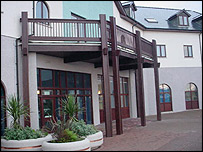Kittens are immensely cute. See below.

That aside, and now I’ve gotten the attention of all of you, I’m not going to write about kittens at all. As those of you who read Abnib (or otherwise read both Bryn and my blog), we had a little kerfuffle yesterday about the Welsh language. I thought I’d probably get a chance to post first, before he did, but I’ve learned very well not to post when drunk, and waited ’til this morning… by which time he’d written his own. In any case…
On The Value Of The Welsh Language
I agree entirely with Bryn that Welsh is indeed, not, definitively, an old dead language. In fact, I was surprised to find that usage of the language is increasing in many areas of Wales (which, to be fair, I find hard to understand the reasons for – I would have always have suspected it of being a language in decline). Statistically speaking, Welsh usage in Aberystwyth has fallen in the last 10 years (source: 1991/2001 census), but this can be attributed to the fact that the survey methods used between these two censuses has changed – for the first time, in 2001, students were counted by their term-time address (which is, to be fair, typically where they spend most of the year), rather than their home-time address. A deeper look at the statistics shows that the number of Welsh speakers in Aberystwyth has increased pretty much in-line with the population over the last decade. A great demonstration of what can be ‘proven’ with statistics.
In any case, Bryn’s blog entry meanders around the topic a little – if his post is directed (as I assume it is) to me, then he makes the mistake that I am comparing the Welsh language to British English, a dialect of English spoken by approximately 15% of English speakers worldwid… and, in fact, we spent a little while later in the evening finding fault with English – which, let’s face it, with it’s non-phonetic structure, crazy spellings, inconsistent double-letters, and double-meanings [right?], isn’t difficult – at which point the comparison came between Welsh and other phonetic languages; in particular Russian (which uses the nightmare Cyrillic alphabet) and Latin (which really is a dead language, sadly), and – kind of – Esperanto.
In the end, I think it’s important for Bryn to realise that it was not him I was trying to spark a debate about (which, in the end, is my only aim when launching with a contraversial point such as the one I made), but a language which he happens to speak (and which, given any kind of free time in my life, I’d still love to learn – something I’ve been promising myself for about four years now, but the most I’ve managed is a brief, free introduction). English is the third-most common “first language”, but then, Windows is the most common “first operating system”, and I don’t think that Bryn would have walked out if I’d have said that the operating system he uses was “old and dead” – to the contrary, this would probably have led to a lively debate about the relative merits of various operating system choice.
It seems that somehow my attack on the Welsh language was seen by Bryn as an attack on him, which it wasn’t. And perhaps more importantly, it doesn’t mean that what I implied is what I mean, only that this could get people thinking and talking about things they might not otherwise think twice about.
On ‘The Video’
Not one to split things into multiple posts if I think of them at the same time, I thought I’d also say a word about the video Bryn mentioned: sorry about that, but again – it’s not you or what you do, it’s just a bit of fun that I think got out of hand amongst the Troma Night troops. Not that that’s going to stop me showing next week’s mini-video (which I don’t think features you, Bryn).
Sorry there, old man. While I stand my ground on the Welsh language icebreaker, and I apologise profusely for letting ‘the video’ get out of hand, I still ought to have thought about your feelings, too. And you shouldn’t have walked out.
Aren’t kittens brilliant? There’s one more for you to look at, here.


